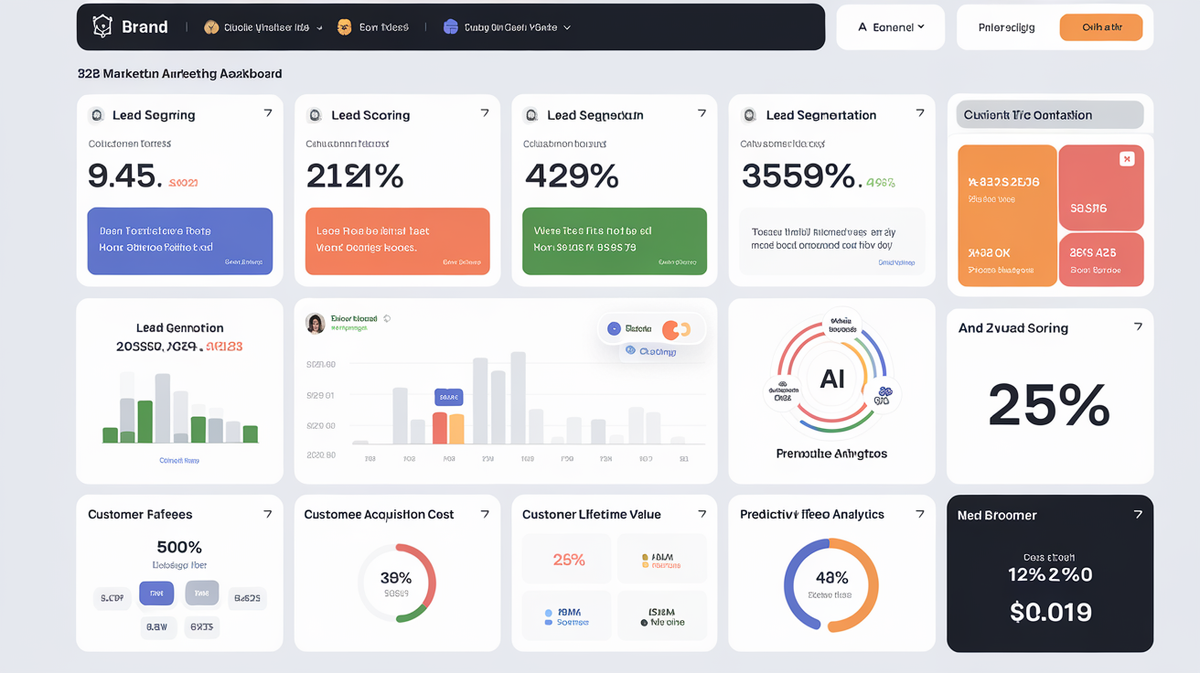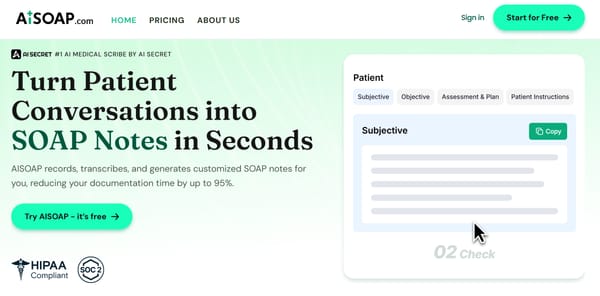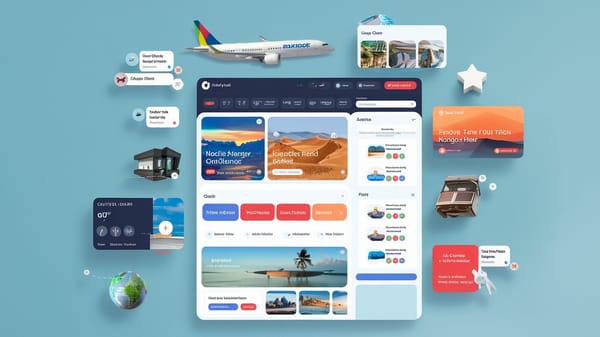What is the B2B Marketing Dashboard: A Comprehensive Guide

In the rapidly evolving landscape of business-to-business (B2B) marketing, the ability to effectively analyze and interpret data is crucial for success. A B2B marketing dashboard serves as a pivotal tool in this process, offering a centralized platform for monitoring and evaluating key performance indicators (KPIs) and metrics related to a company's marketing activities. These dashboards are designed to provide real-time insights, enabling marketers and decision-makers to make informed, data-driven decisions that enhance marketing strategies and drive business growth.
A B2B marketing dashboard aggregates data from various sources, such as CRM systems, marketing automation platforms, and advertising channels, to present a unified view of marketing performance. This integration allows businesses to track customer journeys, measure campaign effectiveness, and optimize resource allocation. By visualizing data through charts, graphs, and tables, dashboards facilitate quick identification of patterns and trends, making complex data more accessible and actionable.
The primary purpose of a B2B marketing dashboard is to streamline the analysis of marketing efforts, providing a clear overview of metrics such as lead generation, conversion rates, customer acquisition costs, and return on investment (ROI). These insights are crucial for identifying areas of improvement, optimizing marketing strategies, and ultimately enhancing the customer experience. Moreover, dashboards support competitive analysis by comparing performance against industry benchmarks, helping businesses maintain a competitive edge.
In summary, B2B marketing dashboards are indispensable tools for modern marketers, offering a comprehensive view of marketing activities and enabling data-driven decision-making. By leveraging these dashboards, businesses can enhance their marketing effectiveness, improve customer engagement, and achieve sustainable growth in the B2B sector. For more detailed insights into the components and benefits of B2B marketing dashboards, you can explore resources like Salesforce Ben and DigGrowth.
You can also visit Oncely.com to find more Top Marketing AI Tools. Oncely partners with software developers and companies to present exclusive deals on their products. One unique aspect of Oncely is its “Lifetime Access” feature, where customers can purchase a product once and gain ongoing access to it without any recurring fees. Oncely also provides a 60-day money-back guarantee on most purchases, allowing customers to try out the products and services risk-free.
Oncely are hunting for the most fantastic AI & Software lifetime deals like the ones below or their alternatives:

Table of Contents
- Understanding B2B Marketing Dashboards
- Definition and Purpose
- Key Components of B2B Marketing Dashboards
- Importance of B2B Marketing Dashboards
- Best Practices for B2B Marketing Dashboards
- Tools for B2B Marketing Dashboards
- Components and Features of B2B Marketing Dashboards
- Lead Generation Metrics
- Pipeline and Revenue Metrics
- Customer Acquisition Costs (CAC) and ROI
- Website and Social Media Performance
- Email Marketing and Customer Retention Metrics
- Marketing Funnel Analysis and Competitive Analysis
- Customization and Integration Capabilities
- Pre-Built and Custom Dashboards
- Predictive Analytics and Multi-Touch Attribution
- Conclusion
- Benefits and Applications of B2B Marketing Dashboards
- Enhanced Decision-Making Capabilities
- Improved Resource Allocation
- Enhanced Customer Experience
- Streamlined Campaign Management
- Integration and Customization Capabilities
- Visualization and Reporting
- Predictive Analytics and Lead Scoring
- Conclusion
Understanding B2B Marketing Dashboards
Definition and Purpose
A B2B marketing dashboard is a centralized platform that aggregates and visualizes key performance indicators (KPIs) and metrics related to a company's B2B marketing activities. These dashboards provide a real-time view of important data, allowing marketers and decision-makers to monitor and analyze the performance of their marketing efforts in the B2B space. The primary purpose of a B2B marketing dashboard is to transform complex data into actionable insights, enabling businesses to make informed decisions, optimize strategies, and allocate resources effectively (cufinder.io).
Key Components of B2B Marketing Dashboards
B2B marketing dashboards typically consist of several key components that help in tracking and analyzing various aspects of marketing performance:
-
Lead Generation Metrics: These metrics track the number of leads generated, conversion rates, and the effectiveness of different lead generation channels. This component is crucial for understanding how well marketing efforts are attracting potential customers (cufinder.io).
-
Pipeline and Revenue Metrics: This component monitors the progress of leads through the sales pipeline, conversion rates, and revenue generated from B2B marketing efforts. It provides insights into the effectiveness of marketing strategies in driving sales and revenue growth (cufinder.io).
-
Customer Acquisition Costs (CAC): This metric calculates the cost of acquiring a new B2B customer and assesses the efficiency of marketing spend. Understanding CAC is essential for evaluating the return on investment (ROI) of marketing campaigns (cufinder.io).
-
Website Performance: This component analyzes website traffic, engagement metrics, and the effectiveness of content marketing initiatives. It helps in understanding how well the website is performing as a marketing tool and identifies areas for improvement (cufinder.io).
-
Social Media Metrics: This component monitors the impact of B2B social media marketing efforts, including reach, engagement, and lead generation. Social media metrics are vital for assessing the effectiveness of social media strategies in reaching and engaging target audiences (cufinder.io).
Importance of B2B Marketing Dashboards
B2B marketing dashboards are essential tools for several reasons:
-
Data-Driven Decision Making: By providing a unified view of various metrics, dashboards enable organizations to make data-driven decisions, optimize marketing strategies, and allocate resources effectively. This leads to improved marketing performance and better business outcomes (cufinder.io).
-
Real-Time Monitoring: Dashboards offer real-time insights into marketing performance, allowing marketers to monitor progress toward goals and react to changes or opportunities as they arise. This capability is crucial for maintaining agility in a rapidly changing business environment (godfrey.com).
-
Performance Evaluation: Dashboards help in evaluating the success of marketing campaigns by providing a clear view of performance metrics. This evaluation is essential for understanding what works and what doesn't, enabling continuous improvement (godfrey.com).
-
Resource Optimization: By identifying areas of strength and weakness, dashboards help organizations optimize their marketing resources, ensuring that efforts are focused on the most effective strategies and channels (cufinder.io).
Best Practices for B2B Marketing Dashboards
To maximize the effectiveness of B2B marketing dashboards, several best practices should be followed:
-
Customization: Dashboards should be customized to align with the company's specific goals and priorities. This customization ensures that the most relevant metrics are tracked and analyzed, providing insights that are directly applicable to the business's objectives (diggrowth.com).
-
Integration: Effective dashboards integrate data from multiple sources, such as CRM systems, email marketing platforms, and social media networks. This integration provides a comprehensive view of marketing performance and enables more accurate analysis (diggrowth.com).
-
User-Friendly Design: Dashboards should be designed to be user-friendly, with clear and intuitive visualizations that make it easy for users to interpret data and gain insights. A well-designed dashboard enhances user engagement and facilitates better decision-making (cufinder.io).
-
Regular Updates: To remain relevant and useful, dashboards should be regularly updated with the latest data and insights. This ensures that decision-makers have access to the most current information when making strategic decisions (godfrey.com).
Tools for B2B Marketing Dashboards
Several tools are available to help businesses create and manage B2B marketing dashboards:
-
Google Looker Studio: Formerly known as Google Data Studio, this free tool helps B2B marketers transform data collected in Google products into visually appealing and customizable reports and dashboards (cufinder.io).
-
AgencyAnalytics: This comprehensive marketing dashboard tool is designed specifically for B2B owners, offering features like SEO tracking, backlink monitoring, and website audits. It is ideal for marketing analytics reporting and functions as an SEO dashboard (cufinder.io).
-
Whatagraph: This tool simplifies analytics tracking across social media platforms and functions effectively as an email marketing dashboard. It offers customization options for dashboard templates, making it easy for busy B2B marketers to digest large amounts of data (cufinder.io).
By incorporating these tools and best practices, businesses can leverage B2B marketing dashboards to gain valuable insights, streamline processes, and drive success in their marketing efforts.
Components and Features of B2B Marketing Dashboards
Lead Generation Metrics
B2B marketing dashboards are essential tools for tracking lead generation metrics, which are crucial for understanding the effectiveness of marketing strategies. These metrics include the number of leads generated, conversion rates, and the performance of various lead generation channels. By monitoring these metrics, businesses can identify which channels are most effective and allocate resources accordingly. For instance, a dashboard might show that social media campaigns are generating more leads than email marketing, prompting a shift in strategy (CUFinder).
Pipeline and Revenue Metrics
Another critical component of B2B marketing dashboards is pipeline and revenue metrics. These metrics provide insights into the progress of leads through the sales pipeline, conversion rates, and the revenue generated from marketing efforts. By analyzing these metrics, businesses can identify bottlenecks in the sales process and optimize their strategies to improve conversion rates. For example, a dashboard might reveal that a significant number of leads are dropping off at a particular stage in the pipeline, indicating a need for targeted interventions (CUFinder).
Customer Acquisition Costs (CAC) and ROI
Customer Acquisition Costs (CAC) and Return on Investment (ROI) are vital metrics included in B2B marketing dashboards. CAC measures the cost of acquiring a new customer, while ROI evaluates the return on investment for different marketing campaigns and channels. These metrics help businesses assess the efficiency of their marketing spend and make data-driven decisions to optimize their strategies. For instance, a high CAC might indicate that a particular marketing channel is not cost-effective, prompting a reevaluation of the marketing mix (CUFinder).
Website and Social Media Performance
B2B marketing dashboards also track website and social media performance metrics. Website performance metrics include traffic, engagement, and the effectiveness of content marketing initiatives. Social media metrics, on the other hand, focus on the impact of social media marketing efforts, including reach, engagement, and lead generation. By analyzing these metrics, businesses can identify which content resonates with their audience and adjust their strategies accordingly. For example, a dashboard might show that blog posts are driving more traffic than videos, suggesting a need to focus on written content (CUFinder).
Email Marketing and Customer Retention Metrics
Email marketing metrics, such as open rates, click-through rates, and conversion rates, are essential components of B2B marketing dashboards. These metrics provide insights into the effectiveness of email campaigns and help businesses optimize their strategies for better engagement. Additionally, customer retention metrics, such as satisfaction and retention rates, assess the effectiveness of customer relationship management strategies. By monitoring these metrics, businesses can identify areas for improvement and enhance customer loyalty (CUFinder).
Marketing Funnel Analysis and Competitive Analysis
Marketing funnel analysis is another crucial feature of B2B marketing dashboards. This analysis examines the different stages of the marketing funnel and identifies areas for improvement. By understanding where potential customers drop off in the funnel, businesses can implement targeted strategies to improve conversion rates. Competitive analysis, on the other hand, compares a company's marketing performance against competitors and industry benchmarks. This analysis helps businesses identify strengths and weaknesses in their strategies and make informed decisions to stay competitive (CUFinder).
Customization and Integration Capabilities
B2B marketing dashboards offer customization and integration capabilities, allowing businesses to tailor the dashboard to their specific goals and priorities. Customization options include selecting and tracking the metrics most relevant to the business's objectives. Integration capabilities enable the dashboard to collect data from various sources, such as CRM systems, email marketing platforms, and social media networks. This integration provides a comprehensive view of marketing performance and facilitates data-driven decision-making (DigGrowth).
Pre-Built and Custom Dashboards
Many B2B marketing analytics platforms offer pre-built dashboards that provide a quick overview of key metrics. These dashboards are designed to help businesses get up and running quickly and offer insights into marketing performance. Additionally, businesses can create custom dashboards to visualize the data most relevant to their analysis. Custom dashboards allow for the selection of various widgets, such as charts, tables, and text boxes, and the application of filters by date, contact, campaign, or other relevant dimensions (Cloud Odyssey).
Predictive Analytics and Multi-Touch Attribution
Advanced B2B marketing dashboards incorporate predictive analytics and multi-touch attribution features. Predictive analytics provide insights into past performance and anticipate future outcomes in marketing campaigns. This capability helps businesses make proactive decisions and optimize their strategies for better results. Multi-touch attribution, on the other hand, shows how influential each marketing campaign is during each stage of the sales lifecycle. This feature offers different attribution models, such as First Touch, Last Touch, and Even Distribution, allowing businesses to understand the impact of their marketing efforts across the customer journey (Salesforce Ben).
Conclusion
B2B marketing dashboards are powerful tools that provide a centralized and real-time view of key performance indicators and metrics related to a company's marketing activities. By leveraging these dashboards, businesses can make data-driven decisions, optimize their marketing strategies, and allocate resources effectively. The components and features of B2B marketing dashboards, such as lead generation metrics, pipeline and revenue metrics, CAC and ROI, website and social media performance, email marketing and customer retention metrics, marketing funnel analysis, competitive analysis, customization and integration capabilities, pre-built and custom dashboards, predictive analytics, and multi-touch attribution, are essential for driving business success in the B2B space.
Benefits and Applications of B2B Marketing Dashboards
Enhanced Decision-Making Capabilities
B2B marketing dashboards serve as a centralized platform for monitoring and analyzing key performance indicators (KPIs) and metrics related to marketing activities. By providing a real-time view of data, these dashboards enable marketers to make informed decisions based on comprehensive insights. According to Oktopost, dashboards consolidate hard metrics, soft metrics, and internet marketing metrics, forming a cohesive narrative that simplifies complex data analysis. This integration allows marketers to evaluate campaign performance, identify trends, and adjust strategies promptly, thereby enhancing decision-making capabilities.
Improved Resource Allocation
One of the significant benefits of B2B marketing dashboards is their ability to optimize resource allocation. By accurately measuring the effectiveness of marketing efforts, businesses can identify which channels, content, and campaigns drive the most engagement, leads, and conversions. This insight allows marketers to allocate resources more effectively, ensuring that investments are directed towards the most impactful strategies. As highlighted by Growth Natives, this optimization not only maximizes return on investment (ROI) but also empowers businesses to gain a competitive edge in a rapidly evolving market.
Enhanced Customer Experience
B2B marketing dashboards play a crucial role in improving the customer experience by providing insights into how prospects interact with a business. By analyzing data on customer behavior and preferences, marketers can tailor their strategies to meet the specific needs of their target audience. This personalization leads to improved customer acquisition, retention, and revenue growth. As noted by WebFX, data-backed decisions enable businesses to enhance the client experience, resulting in increased customer engagement and satisfaction.
Streamlined Campaign Management
Marketing dashboards facilitate streamlined campaign management by offering a comprehensive view of all marketing activities. They allow marketers to track the performance of various campaigns, identify areas for improvement, and implement changes swiftly. For instance, Oktopost emphasizes the importance of using dashboards to manage tasks such as email marketing campaigns, evaluate marketing ROI, and oversee social media management. By providing an aerial view of campaign progress, dashboards ensure that nothing slips through the cracks, enabling marketers to maintain control over their strategies.
Integration and Customization Capabilities
B2B marketing dashboards are designed to integrate data from multiple sources, such as CRM systems, email marketing platforms, and social media networks. This integration capability allows businesses to have a unified view of their marketing data, facilitating comprehensive analysis and reporting. Additionally, dashboards offer customization options, enabling users to tailor the metrics they track to align with their specific marketing goals and objectives. As described by CUFinder, this customization ensures that dashboards meet the unique needs of each business, enhancing their effectiveness as a marketing tool.
Visualization and Reporting
Effective visualization strategies are essential for transforming raw data into understandable metrics that aid in decision-making. B2B marketing dashboards utilize intuitive graphs, charts, and heat maps to depict performance over time, compare different campaigns, and highlight engagement hotspots. These visualizations make it easier for marketers to interpret data and communicate insights to stakeholders. According to Weberlo, dashboards allow for seamless data presentation, ensuring that stakeholders can easily grasp the results of marketing efforts without being overwhelmed by complex data sets.
Predictive Analytics and Lead Scoring
Advanced B2B marketing dashboards incorporate predictive analytics to enhance lead scoring accuracy. By leveraging data insights and predictive models, businesses can evaluate lead quality based on behavior and demographics, resulting in a more nuanced approach to prioritizing leads for outreach. This capability is crucial for optimizing marketing strategies and ensuring that efforts are focused on high-potential prospects. As highlighted by Weberlo, predictive analytics in dashboards provide valuable insights that drive more effective lead management and conversion strategies.
Conclusion
B2B marketing dashboards are indispensable tools for modern marketers, offering a range of benefits that enhance decision-making, resource allocation, customer experience, and campaign management. By integrating data from various sources and providing customizable visualization options, these dashboards empower businesses to optimize their marketing strategies and achieve their goals. As the business landscape continues to evolve, the importance of leveraging B2B marketing dashboards to gain a competitive advantage cannot be overstated.
References
- https://diggrowth.com/blogs/analytics/b2b-marketing-analytics-implementation-guide/
- https://growthnatives.com/blogs/analytics/best-approaches-to-b2b-marketing-analytics/
- https://www.weberlo.com/blog/b2b-marketing-analytics
- https://cloudodyssey.co/blog/b2b-marketing-analytics/
- https://www.webfx.com/analytics/b2b/
- https://www.oktopost.com/blog/11-marketing-dashboards-that-make-you-think/
- https://cufinder.io/blog/the-ultimate-guide-to-b2b-marketing-dashboard/
- https://www.copy.ai/blog/b2b-marketing-kpis





